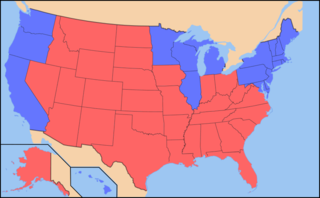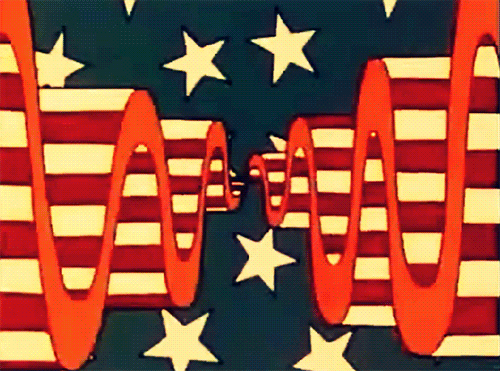Part 2
Are There Really Two Americas?
 |
| Source: Wikimedia Commons/public domain |
It’s well known that people of differing political viewpoints are increasingly not living close to one another, not befriending one another, and not even speaking to one another.
This political divide has sometimes been characterized as a “culture war”, a battle over the core values that govern society. In fact, some have suggested that there are now “two Americas”—the red states and the blue states—geographically separate and morally at odds. If we are to believe the words of Patrick Henry’s 1799 speech, “United we stand, divided we fall,” it seems we’re headed for a fall.
It is indisputable that people living in different states tend to have differing political stances. A quick glance at the electoral map from any presidential election since 1992 will tell you that California favors progressive candidates while Texas favors conservative ones. It’s tempting to view such differences in voting behavior as reflecting a deep divide in American society. But, are people of different regions really all that different in their core values? Do we really have fundamentally different definitions of what constitutes goodness?
To help answer this question, psychologists Nansook Park, Christopher Peterson, and Martin Seligman conducted an online survey comparing the basic values and virtues of people in all 50 states as well as in 53 other countries. They used an ingenious strategy to recruit participants. One of the study’s authors, Seligman, had recently written a worldwide best-selling book, Authentic Happiness. In it, he offered readers the opportunity to take an online test known as the Values in Action Inventory and receive feedback for free. As a result, their sample included more than 100,000 participants, a number virtually unheard of in psychological research. For each person, the test generated a profile of 24 character virtues ranked from those that the person considered “very much like me” to those he or she considered “very much unlike me.”
The study’s results sharply contradict the conventional political wisdom that regions of the U.S. differ in their core values. Regardless of state, the most commonly endorsed virtues were kindness, fairness, honesty, gratitude, and good judgment, while the least commonly endorsed were prudence, modesty, and self-regulation/discipline. In fact, except for religiousness, which was endorsed by people in the South at slightly higher levels than elsewhere, the researchers found no significant geographic differences in people's profiles of virtues, on average.
Equally informative was how Americans’ virtues compared with those of people in other nations. Given the frequency with which “American values” are contrasted with those of other countries, it may seem surprising that Park, Peterson, and Seligman found significant overlap with nations as far-flung as China, Turkey, Argentina, and Zimbabwe, among many others.
This isn’t the only study showing such striking similarities across cultures. Researcher Robert Biswas-Diener surveyed people from three dramatically different groups: (1) the Inughuit, an isolated group in Northern Greenland; (2) the Maasai, a tribal group in Western Kenya; and (3) American college students. Participants were given the same list of 24 virtues used in the previous study and asked to rate the importance of each one in their society. For all three groups, there was widespread acknowledgment of the importance of all 24 virtues. In fact, there was only one instance in which less than a majority endorsed a virtue: Only 48% of the American college students said they recognized forgiveness as an important concept in their society.
So, people around the world as well as within our own 50 states have surprisingly similar views of what makes people good: They’re honest, kind, and fair. They show good judgment and gratitude toward their fellow human beings.
All of these findings concern the average profiles of values in different regions of the world. Not every individual within those regions shares exactly the same values and virtues, of course. And, none of this magically solves our disputes over issues like gun control, immigration, climate change, or political corruption. There’s still plenty of room for conflict among people with similar core values.
But, even in the midst of our heated disagreements, it’s important to remember that we may not be that different from our political foes, at least in terms of fundamental values.
Patrick Henry would be relieved to know that we might not be that divided after all.
Part 1- Are Democrats Creating Two Americas?


One of the penalties for refusing to participate in politics is that you end up being governed by your inferiors. -- Plato (429-347 BC)
THE PATRIOT
Knowledge Is Power And Information is Liberating: The FRIENDS OF LIBERTY BLOG GROUPS are non-profit blogs dedicated to bringing as much truth as possible to the readers.
COMPLAINTS ABOUT OUR GOVERNMENT REGISTERED HERE WHERE THE BUCK STOPS!
GUEST POSTING: WOULD YOU LIKE TO BE PUBLISHED ... DO YOU HAVE SOMETHING ON YOUR MIND?
Knowledge Is Power - Information Is Liberating: The Patriot Welcome is a non-profit blog dedicated to bringing as much truth as possible to the readers.
Big Tech has greatly reduced the distribution of our stories in our readers' newsfeeds and is instead promoting mainstream media sources. When you share with your friends, however, you greatly help distribute our content. Please take a moment and consider sharing this article with your friends and family. Thank you
Keep on seeking the truth, rally your friends and family and expose as much corruption as you can… every little bit helps add pressure on the powers that are no more.

No comments:
Post a Comment